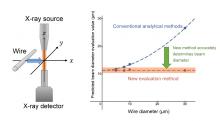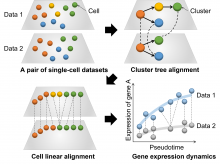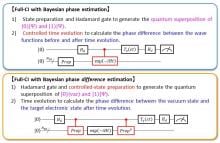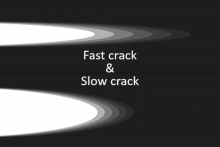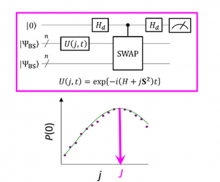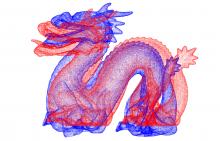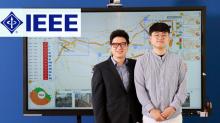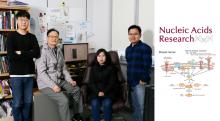Computer Science Algorithms
News
09 Jan 2024
Prof Sam Kwong Tak-wu, Associate Vice-President (Strategic Research) and Chair Professor of Computational Intelligence of Lingnan University, co-authored the research paper that has received the Best Paper, Chester W. Sall Memorial Awards 2024 from the Institute of Electrical and Electronics Engineers (IEEE), the world's largest technical professional organisation dedicated to advancing technology for the benefit of humanity. This honour was published in their monthly peer-reviewed scientific journal “IEEE Transactions on Consumer Electronics”. Only three Best Paper Awards are given each year, and the competition is extremely fierce.
03 Mar 2023
Machine learning algorithms allow analysis and characterization of the atomic arrangement of silicon surface superstructures without the need for human expertise.
07 Feb 2023
A research group at Osaka Metropolitan University has derived a new evaluation method for the measuring the size X-ray microbeams (diameter) through mathematical analysis. The group then verified the validity of the mathematically derived evaluation method by measuring the diameter of X-ray microbeams using metal wires of various diameters with an X-ray fluorescence analysis system for small areas and found that it was possible to calculate the beam diameter more accurately than the previous conventional evaluation method.
14 Oct 2022
Researchers from Osaka University have developed a computational analysis tool called CAPITAL for comparative analysis of single-cell RNA sequencing data with complicated branching trajectories. As cells undergo a dynamic process, they can be placed on a “pseudotime trajectory” to analyze the gene expression changes throughout the process. While previously only straightforward linear trajectories could be compared, CAPITAL is proven to be able to accurately compare branching trajectories, significantly advancing the field of high-throughput single-cell sequencing.
26 Nov 2021
In a continuing effort to improve upon previous work, a research team at the Graduate School of Science, Osaka City University, have applied their recently developed Bayesian phase difference estimation quantum algorithm to perform full configuration interaction (full-CI) calculations of atoms and molecules without simulating the time evolution of the wave function conditional on an ancillary qubit. Superior to conventional methods in terms of parallel execution of quantum gates during quantum computing, this new algorithm is expected to be much easier to implement in actual quantum computers.
30 Jul 2021
Researchers from The University of Tokyo Institute of Industrial Science develop an experimentally supported mathematical model that defines the velocity jump mechanism in crack propagation
19 Jul 2021
Researchers from The University of Tokyo Institute of Industrial Science report a machine learning-based model for predicting the bonding properties of materials
17 Mar 2021
Researchers improve their newly established quantum algorithm, bringing it to one-tenth the computational cost of Quantum Phase Estimation, and use it to directly calculate the vertical ionization energies of light atoms and molecules such as CO, O2, CN, F2, H2O, NH3 within 0.1 electron volts of precision.
18 Jan 2021
Researchers at Osaka City University use quantum superposition states and Bayesian inference to create a quantum algorithm, easily executable on quantum computers, that accurately and directly calculates energy differences between the electronic ground and excited spin states of molecular systems in polynomial time.
19 Nov 2020
Scientists devise a 2D-material–based stacked structure with applications in reducing computing power consumption
03 Nov 2020
A group of students, affiliated with South Korea's Ulsan National Institute of Science and Technology (UNIST) has created a map to help track the spread of the COVID-19 in Ulsan region.
25 Sep 2020
Researchers at Osaka City University create a quantum algorithm that removes spin contaminants while making chemical calculations on quantum computers. This allows for predictions of electronic and molecular behavior with degrees of precision not achievable with classical computers and paves the way for practical quantum computers to become a reality.
25 Aug 2020
A research team led by Prof Jeongho Kwak from Daegu Gyeongbuk Institute of Science and Technology (DGIST) has designed a novel system architecture where collaboration between cloud service providers and mobile network operators plays a central role. Such a collaborative architecture would allow for optimizing the use of network, computing, and storage resources, thereby unlocking the potential of various novel services and applications.
06 Mar 2020
Point set registration problems, i.e. finding corresponding points between shapes represented as point sets, are important in a variety of fields, so algorithms have been developed. Here, a new algorithm is discovered for point set registration problems. This algorithm is demonstrated to solve several typical problems remarkably faster than conventional methods and with the highest accuracy. This novel algorithm will be beneficial to a wide variety of technologies including computer graphics, computer vision, authentication etc.
03 Sep 2019
A recent study, affiliated with South Korea's Ulsan National Institute of Science and Technology (UNIST) has presented an artificial intelligence technology that can predict traffic conditions for the next 5 to 15 minutes at an error rate of less than four kilometers an hour.
26 Aug 2019
A recent study, affiliated with South Korea's Ulsan National Institute of Science and Technology (UNIST) has presented a novel approach to identify cancer suppressing microRNA (miRNA) targets and relevant cellular signaling pathways through large-scale gene-expression data analysis.
10 Apr 2019
Tohoku University researchers have developed an algorithm that enhances the ability of a Canadian-designed quantum computer to more efficiently find the best solution for complicated problems, according to a study published in the journal Scientific Reports.

07 Nov 2018
A new reconfigurable security solution outperforms currently available ones in protecting Internet of things (IoT) devices and data by exploiting edge computing.
29 Oct 2018
A new algorithm could help scientists decide the best atomic structures for the materials they design.
Events
Sorry, nothing coming up for this discipline
Researchers
Angel Investor and a Vision-driven entrepreneur/executive with career-long record of business growth and innovation.
Jia Liu is the Director of the Center for Data-Driven Discovery and associate professor at CMB Group at Kavli IPMU. Her research integrates data science techniques in the study of large-scale structures of the universe (dark matter, halos, filaments, voids).
Giants in history
Sorry, nothing coming up for this discipline




